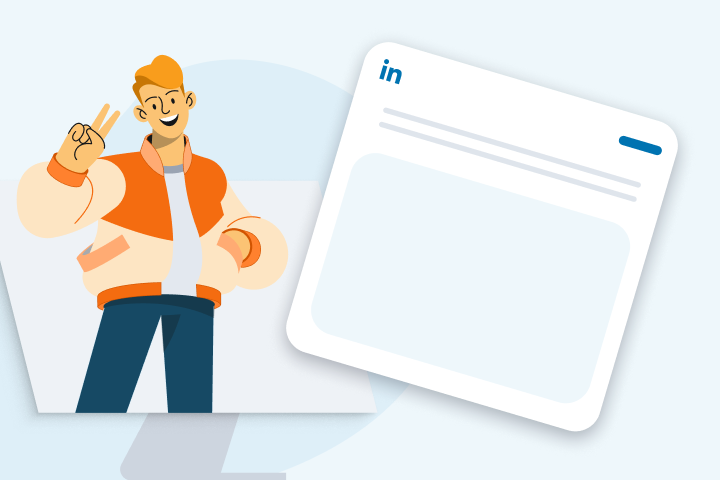Engaging Content and Social Media Marketing Strategies
Imagine you’re scrolling through Facebook and see a carousel post featuring handy tips on how to winterize your car. You click and become engaged with the content. Then, you notice that the post is from a local auto parts store. You remember you’ve been wanting to replace your car battery. You head to their website and purchase. That is the power of content marketing on social media.
Unlike a branded ad, which can be easily overlooked when scrolling on social media, content marketing captures your attention. It draws you in with robust content, builds trust, and entices you to convert and make a purchase. Social media marketing complements content marketing by acting as the channel to reach (and communicate) with your target audience.
When used together, content marketing and social media marketing form a dynamic duo that can help your brand increase brand awareness, engagement, and generate leads. Then, when you utilize employee advocacy to amplify your content, you’re leveling up to create a strong social media content marketing strategy.
In this article, we’ll explain the benefits as well as the differences between social media marketing and content marketing, how to use employee advocacy to distribute content, and share some content ideas.
Content Marketing
Content marketing is a marketing strategy that brands use to create engaging, relevant content for their audiences. Content marketing in digital marketing isn’t meant to be a quick hard sell, but rather to inform and delight over time.
Content marketing also comes in a variety of forms. To most, it’s blog posts designed to inform and educate, but it can take on other formats, too. Email campaigns, newsletters, podcasts, e-books and guides, videos, and of course, social media, are all other formats of content marketing.
When used in conjunction with one another, or to help provide an omnichannel experience, you keep your audience engaged. By using content marketing to attract and retain an audience, companies will be building brand recognition and generating leads, which will result in sales, and ideally, repeat clients.
Benefits of Content Marketing
The benefits of content marketing are numerous. For B2B brands, some top benefits are:
- Increasing Conversions.
- Boosting Brand Awareness.
- Cultivating Customer Relationships.
- Informing the Audience.
- Building Industry Authority.
To earn these benefits, you will need a content marketing strategy. Let’s take a look at the components of an effective B2B content marketing strategy.
B2B Content Marketing Strategy
B2B content marketing is the process of creating and distributing content with the intent to gain the attention of other businesses and convert them into clients. Types of B2B content include blog posts, videos, case studies, white papers, podcasts, etc. But, before you can create and distribute this content, you need a B2B content marketing strategy.
To craft an effective content marketing B2B strategy follow these steps:
-
Identify Your Audience. Remember, unlike B2C, a B2B audience is a business that could use your product or service, not individual customers. Once you identify your audience (we recommend creating buyer personas), you can create content to educate and address specific pain points and needs.
-
Learn Your Competitive Differentiators. In order to offer a unique selling point (USP) to your potential clients, you need to research your industry competitors. This will help you narrow down what makes your product or service unique and aids you in creating content that shows how you can help your audience better than the alternatives.
-
Decide Your Goals. Creating SMART goals (specific, measurable, actionable, relevant, and time-bound) will help you stay on track and measure your progress.
-
Choose Your Distribution Platform. For B2B, using LinkedIn is a no-brainer because it is an ideal social platform for targeting businesses. However, you may find that using Facebook and TikTok makes sense for your audience, too.
-
Create Content. Robust, visual content is key to capturing your audience’s attention and setting your brand apart from the competition. Use text, videos, and images to demonstrate your expertise and educate your audience. Don’t forget to tailor your content to the social platform, too.
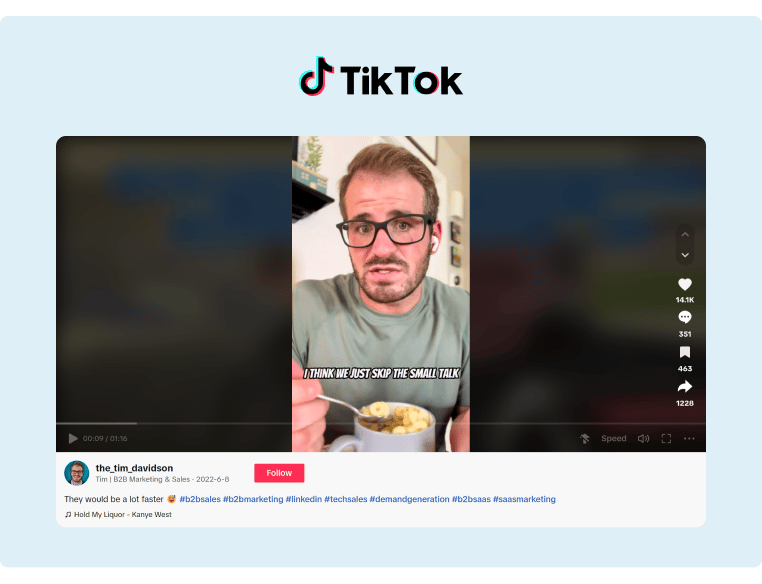
Source: Tim Davidson on TikTok
B2B Content Ideas for LinkedIn
LinkedIn is an excellent platform for sharing B2B content. Not sure what content to post on LinkedIn? Here are a few LinkedIn content ideas to help you get started:
- Thought Leadership.
- LinkedIn Newsletters.
- Live Events.
- LinkedIn Ads.
- Polls.
- Company News.
- Behind-the-Scenes.
Remember to create content that not only will add value, but also resonate with your audience. While it may be tempting to create a poll because everyone is using polls, don’t if your audience doesn’t typically engage with them.
Now let’s see some B2B content marketing strategies in action.
Content Marketing Examples
Here are a couple of our favorite B2B content marketing examples.
1. HubSpot’s Marketing Blog
HubSpot’s marketing blog is a favorite resource for B2B content marketers and for a good reason. Its content is educational and shareable. The latter is important because it’s a clever tactic for increasing brand reach.
For example, when you come across a blog post that you think your audience would like, HubSpot makes it easy to share by including social media share icons at the end of every article.
HubSpot content also ranges from relevant industry trends to evergreen, which capitalizes on trends as well as growing long-term brand awareness.
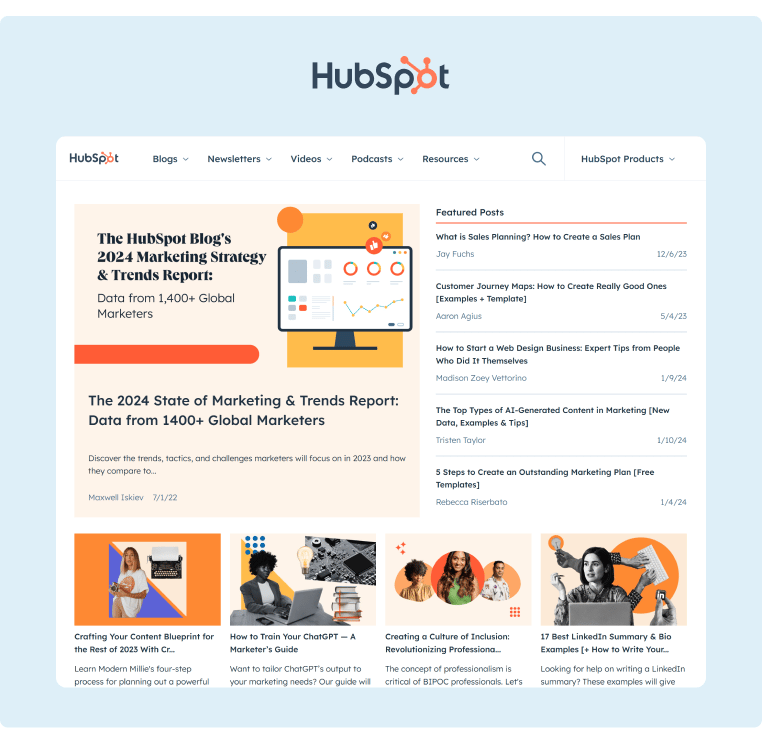
Source: HubSpot
2. MOZ Whiteboard Friday
MOZ’s Whiteboard Friday is an educational video series that was created by Rand Fishkin many years ago. It’s still going strong and is a go-to resource for SEO marketers.
Whiteboard Friday’s clever video format provides free SEO training without feeling like you’re trapped in a boring webinar. Plus, MOZ team members’ dry humor helps, too.
MOZ also repurposes its video content into blog format, too, giving its audience two options to consume its content. This is perfect for when you don’t have time to watch a video and prefer to quickly skim content.
Source: MOZ
3. RollWorks Insider Newsletter
Owning your audience is important, and so is meeting them where they already are. Enter the RollWorks Insider Newsletter. While they could send their newsletter to only their email list, they take the extra time to publish it on LinkedIn.
By publishing it on LinkedIn, people can subscribe to their company news without being part of their email list. Here, subscribers can still leave comments and engagements on the newsletter, just like you would a social post, which serves as one more format of content amplification. 
Source: Rollworks, a division of NextRoll
Social Media Marketing
You’ve got great content, now it’s time to share it. Using social media as a marketing channel can be an effective form of content distribution. But, social media marketing, like content marketing, also needs a strategy. You can’t just post content and forget it; you need to be strategic.
Your social media content marketing strategy will, for the most part, mirror your content marketing strategy. You’ll identify your audience, choose goals, select platforms to share content on, pick measurable goals, etc. However, there are a few more pieces to add to your social media content strategy framework:
- Content Plan and Guidelines. Decide what content to post, how often to post, and when to engage with your content.
- Team Responsibilities. Determine what your social media team will be responsible for. For example, posting and engaging with content, maintaining and optimizing social profiles, etc. Regardless of who is responsible for posting the content, it’s important to collaborate with other teams for employer branding and talent acquisition opportunities, as well as areas to highlight thought leadership, executives, and product updates.
- Organic and Paid Media Advertising. To supplement your organic social media posts, you may want to use paid social media advertising to complement your social media efforts.
- Types of Social Media Marketing. Influencer marketing, affiliate marketing, and employee advocacy can all help you distribute content to the right people at the right time. Be sure to consider what type of content is going to work best to achieve your outcomes and don’t spread yourself too thin.
Once you have your social media content strategy framework set, the next step is to brainstorm some social media marketing content ideas.
Social Media Marketing Examples
Need a little inspiration? Here are a couple of our favorite social media marketing examples.
1. HubSpot: Actionable Tips Video
Once again, HubSpot proves why it’s a master of B2B content and social media marketing. In this example, HubSpot shares an Instagram post featuring a brief video of three quick tips to crush that prospecting email.
The video takes a key marketing concept and boils it down into quick, actionable tips.
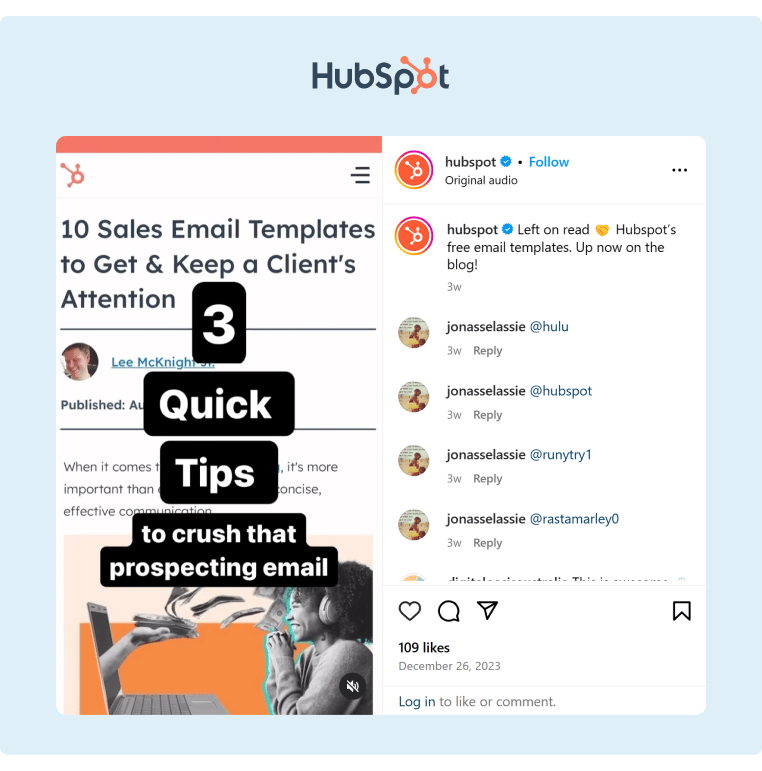
Source: HubSpot
2. Semrush: Infographic
There’s no quicker way to lose someone’s interest than to present them with a huge block of text. SaaS platform Semrush knows to capture its audience’s attention, content needs to be visual.
In this example, they make the topic of keyword research, specifically how to define a keyword’s value, visual with an infographic:
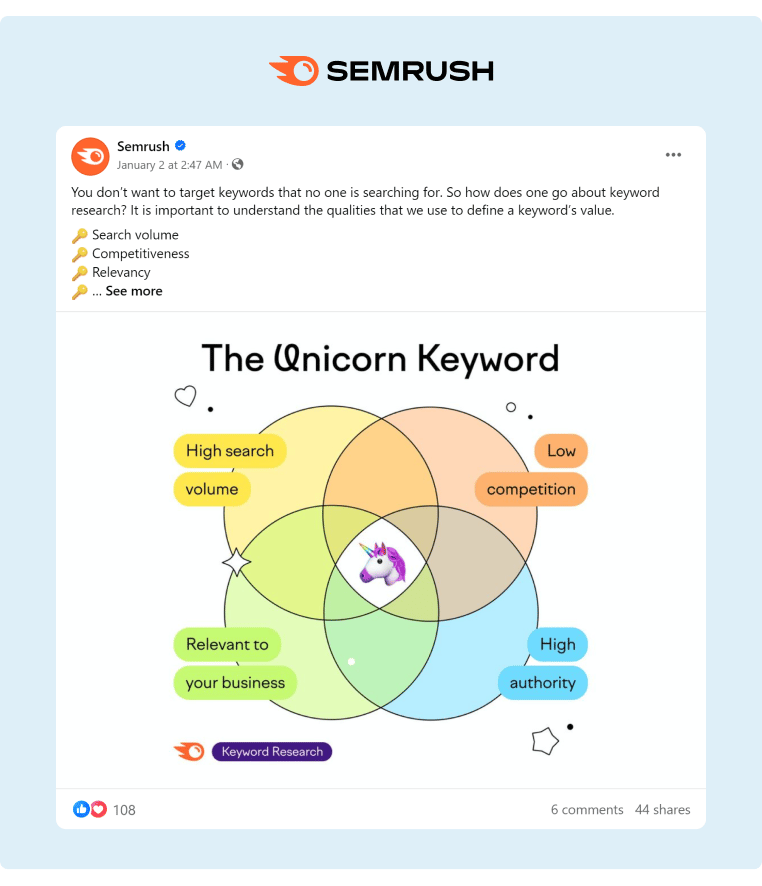
Source: Semrush
Now let’s take these two examples of social media content marketing and explore how to leverage employee advocacy to take these content pieces to the next level.
Social Media Content Strategy
Effective content marketing on social media channels will have a positive impact on your brand. However, to give your brand an even bigger competitive edge, your social media content strategy needs to also include an employee advocacy program.
Employee Advocacy
Employee advocacy is a content promotion technique where your employees engage and share branded content with their professional networks. Leveraging employee advocacy as a content distribution channel will broaden your brand’s reach even further, and that’s not all. Additional benefits of employee advocacy include attracting (and retaining) employees.
In the previous section, we shared a couple of content marketing examples from HubSpot and Semrush. By using employee advocacy, these two brands can amplify their content by having employee advocates repost and share it with their professional networks. By sharing branded content with their social networks, employee advocates highlight themselves as an authority and improve their employee engagement, which in turn, gets vital information to your product users in their network faster, boosts brand awareness, and can even generate new leads.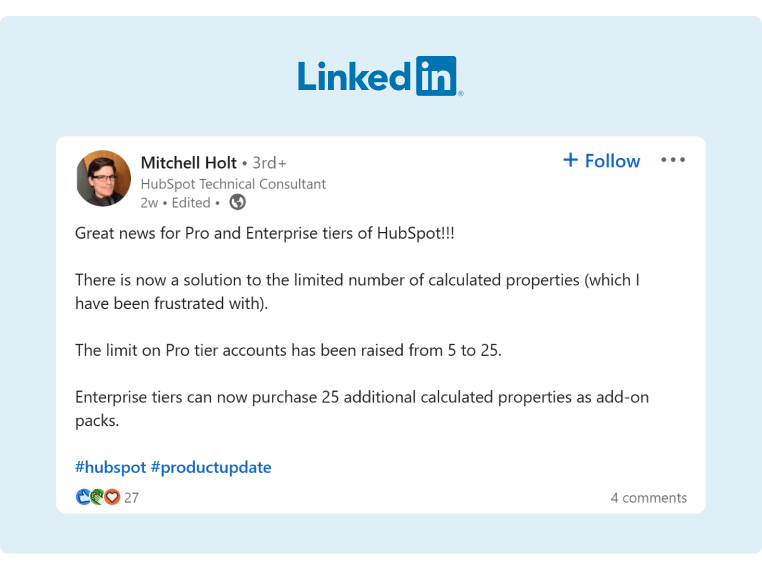
Source: LinkedIn
For even more genuine engagement, an employee advocacy tool like GaggleAMP can help your brand provide personalized employee engagement at scale. Our platform enables you to curate content for teams, assign engagement activities with specific instructions, schedule social posts, and review analytics to see how your brand reach and engagement is performing on your social channels.
LinkedIn, in particular, is a social channel that all B2B brands should be utilizing. The platform’s targeting and search capabilities make it ideal for targeting decision makers.
Ready to Elevate Your Content and Social Media Marketing?
Take your content and social media marketing a step further by implementing an employee advocacy platform. Our employee advocacy tool GaggleAMP will help you streamline the process of creating and distributing content via your employee advocates. Schedule a demo today.






